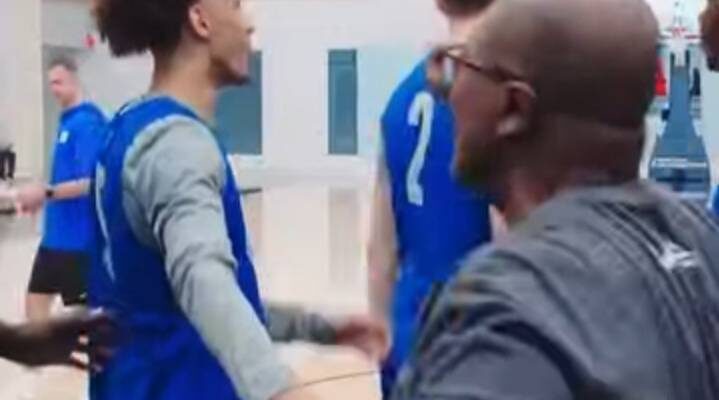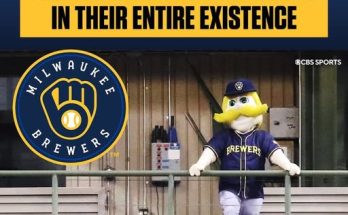“Without Flagg, It’s Not the Same.” — In the Post-Cooper Era, Practice Vibes Change
When Cooper Flagg arrived at Duke, the buzz surrounding his talent was palpable. A generational recruit, Flagg was more than just a promising freshman; he was a beacon of hope for the Duke program, a symbol of renewed vitality and leadership amid a period of transition. Now, as summer practices progress without him, something feels undeniably different — not just on the court but in the very air that surrounds the team’s workouts. Fans, analysts, and insiders alike are picking up on it: Without Flagg, it’s simply not the same.
Cooper Flagg’s impact extended far beyond the stat sheets. Physically gifted and mentally sharp, Flagg had a way of energizing his teammates in a manner few players could. Watching him move through drills was like seeing a spark set off a small fire that soon engulfed everyone around him. His enthusiasm was infectious; his commitment relentless.
Duke’s summer practices, typically grueling and monotonous by nature, transformed with Flagg in the lineup. Coaches frequently mentioned his work ethic as a standard-bearer, and fellow players talked about how his leadership — though quiet — was unmistakable. His presence lifted the team’s morale, pushing others to dig deeper, compete harder.
But beyond motivation, Flagg brought a competitive edge that redefined the team’s culture. His ability to play multiple positions, defend with intensity, and score with ease allowed the coaching staff to experiment with new lineups and strategies. The summer of Flagg’s arrival became one of Duke’s most energetic and promising periods of preparation in recent years.
When news broke that Cooper Flagg would not be returning for the summer session, the ripple effect was immediate. The energy that once buzzed around Cameron Indoor Stadium seemed to dim slightly. Players noticed the absence of his drive during workouts; coaches lamented the loss of a player who could set the tone on both ends of the floor.
Fans who have followed the summer practices closely have voiced their concerns on social media and forums. “Without Flagg, it feels like the team lacks that spark,” said one longtime Duke fan. “The effort seems a notch down, and even the intensity feels off.”
But why does one player’s absence create such a tangible shift? To understand this, it’s essential to delve into the nature of leadership and chemistry within a basketball team, particularly during summer practice sessions, when habits are formed and identities forged.
Leadership in basketball transcends the mere act of speaking up or wearing a captain’s patch. It’s about setting examples when no one is watching, pushing through fatigue, and refusing to settle for anything less than excellence. Cooper Flagg epitomized this kind of leadership.
While other players might have been vocal leaders or energetic motivators, Flagg led through his actions. His relentless hustle on defense, his tireless pursuit of improvement, and his respect for teammates and coaches alike created a culture that made everyone want to elevate their game.
In his absence, a vacuum has emerged — one that’s difficult to fill, especially during the summer. New leaders are trying to step up, but leadership chemistry takes time to develop. It’s not as simple as assigning roles; it’s about building trust and shared accountability.
Summer practices at elite programs like Duke are intense by design. These are the sessions where players build endurance, sharpen fundamentals, and work on team concepts far from the pressure of the regular season. The atmosphere should be electric, with players pushing each other to the brink.
With Flagg gone, observers note that the intensity has dropped perceptibly. Effort levels are harder to sustain without a central figure who embodies the grind mentality. Some players are undoubtedly working hard, but the collective energy hasn’t reached the same fever pitch.
Coaches have remarked privately that while the fundamentals remain strong, there is a subtle drop in hustle plays — those extra sprints, dives for loose balls, or relentless defensive rotations — that used to be a hallmark of the Flagg-led sessions.
Basketball teams thrive on chemistry. It’s the invisible thread that weaves individual talents into a cohesive unit. Chemistry can be felt most acutely during practice, where teammates develop unspoken understandings and sync their movements without verbal cues.
Flagg’s departure has unsettled that delicate balance. New rotations, altered roles, and shifting minutes mean players must reorient themselves. The natural vitality that Flagg’s presence injected into the group seems to be missing, creating a practice vibe that feels more mechanical and less organic.
Players report a change in atmosphere. The camaraderie that used to flow seamlessly during drills now requires more deliberate effort to maintain. Without Flagg’s calming but driven presence, some teammates feel more isolated in their struggles or less inspired to lead by example.
The fanbase is never shy about sharing their thoughts, and this summer’s absence of Cooper Flagg has sparked numerous discussions.
“Duke without Flagg at summer workouts feels like a band without its lead guitarist,” wrote a popular Twitter user. “You still hear the music, but it’s missing that edge.”
Another fan noted, “You can see it in the little things — less communication on defense, fewer full-court sprints, and fewer high-fives after a good play. The vibe is off.”
Forums dedicated to Duke basketball have been buzzing with speculation about how this change will affect the team’s upcoming season. Many agree that while the talent remains, the intangibles — leadership, effort, and vitality — will be the deciding factors.
Coaching staff have faced a difficult challenge replacing Flagg’s influence on the court and in the locker room. Some have taken to emphasizing mental toughness and individual responsibility more explicitly in team meetings and workouts.
Efforts to cultivate new leaders are underway. Senior players and veterans are encouraged to step into leadership roles to fill the gap. Coaches have implemented extra conditioning drills and team-building activities aimed at rekindling the spark.
Still, the consensus is that no single player can replicate Flagg’s unique combination of skills and leadership style. It’s a collective effort, but one that may take time to solidify.
Looking ahead, the question remains whether Duke can reclaim the energy and practice vibes it enjoyed with Flagg on the roster. History suggests it’s possible, but it requires deliberate action and patience.
Developing new leaders, fostering stronger team chemistry, and recommitting to a culture of hard work will be critical. The offseason is an opportunity for players to redefine their roles and for the coaching staff to instill a renewed sense of purpose.
There are promising signs. Some younger players have shown flashes of leadership, and the team’s commitment to growth remains intact. The challenge will be sustaining this over the long haul without the magnetic presence of a player like Flagg.
Cooper Flagg’s departure marks the end of a distinct chapter in Duke basketball’s recent history. His influence on summer practices was undeniable — from leadership and effort to vitality and chemistry, he was the heartbeat of the team.
Now, the Blue Devils must navigate the post-Flagg era, learning how to build a similar culture from within. The road ahead is filled with questions and challenges, but also with opportunities.
Ultimately, the practice vibes may never be quite the same as they were with Cooper Flagg. Yet, with determination and resilience, Duke can forge a new identity, one that honors Flagg’s legacy while carving its own path forward.
For now, fans watch, waiting for the team to recapture that unmistakable spark — the one that says, “Without Flagg, it’s not the same, but something great is still to come.”



